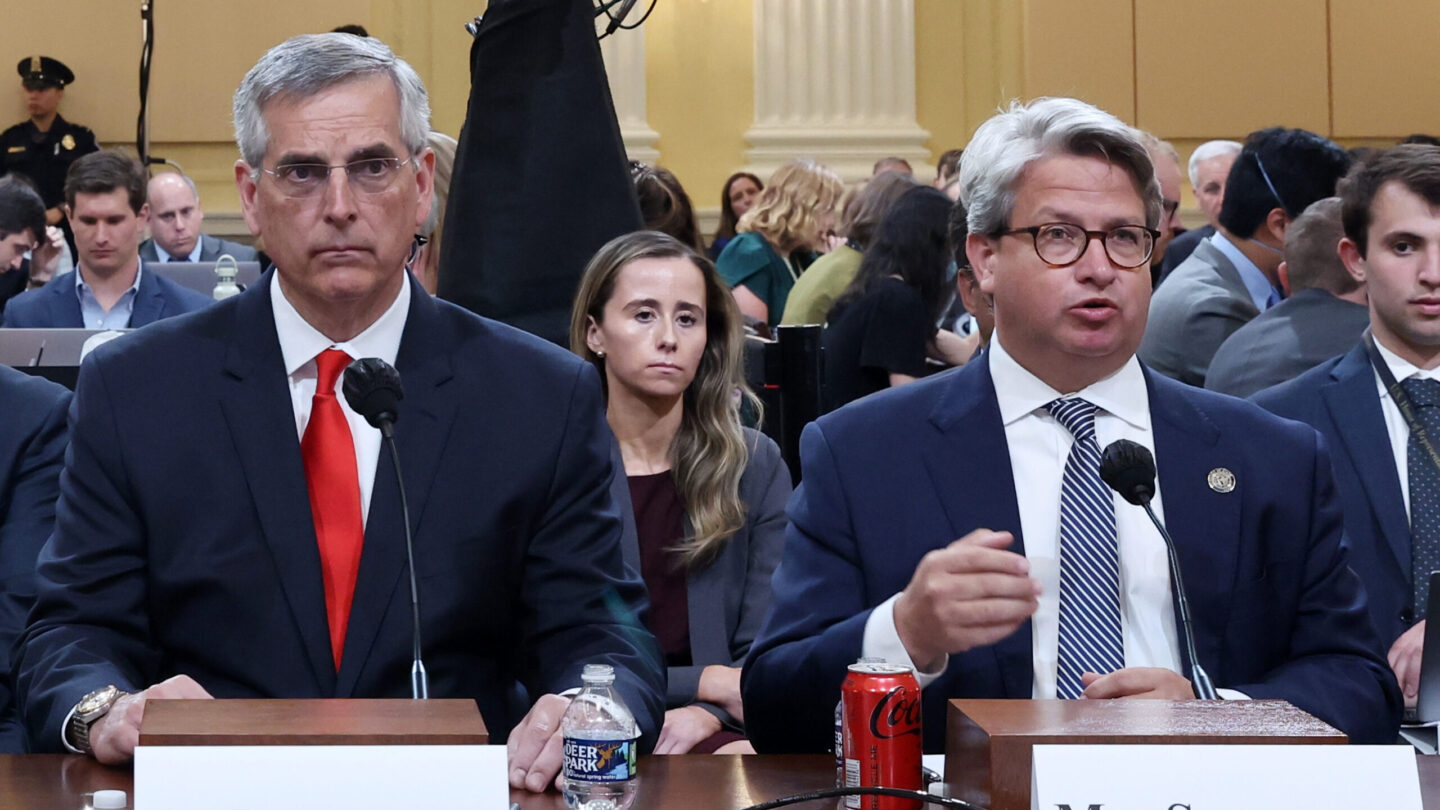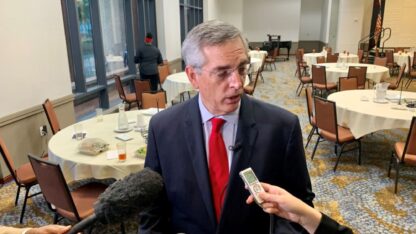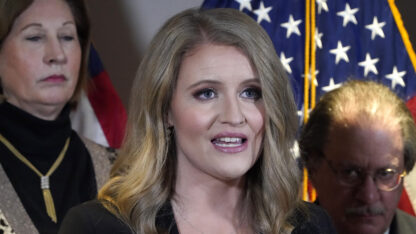Georgia officials fact-check an infamous Trump phone call in real time

Michael Reynolds / Michael Reynolds
Former President Donald Trump famously pressured Georgia Secretary of State Brad Raffensperger, a fellow Republican, to overturn the state’s presidential election result in a January 2021 phone call that lasted more than an hour.
At Thursday’s hearing, Rep. Adam Schiff played clips of that recording in front of Raffensperger and Georgia elections official Gabriel Sterling, pausing to ask them questions and fact-check the former president’s false claims in real time.
He also led with some important context about what preceded the Jan. 2 call. The White House was persistent in trying to reach Raffensperger, with staffers including former Chief of Staff Mark Meadows calling and texting his office 18 times to try to set up a call with the president.
Meadows himself visited a signature-auditing site in Georgia to meet with the chief investigator who was supervising the process there. Trump spoke on the phone with that investigator, Frances Watson, the following day, continuing to push false claims and telling her that “when the right answer comes out you’ll be praised.”
Notably, Trump had already been told repeatedly by top Justice Department officials that his claims about widespread voter fraud in Georgia — the claims he would go on to make in the 67-minute phone call with Raffensperger— were completely false. And Georgia had already investigated those claims, found none, and certified its election results.
“I’ve been traveling through the state of Georgia for a year now, and simply put, in a nutshell, what happened in fall of 2020 is that 28,000 Georgians skipped the presidential race, and yet they voted down-ballot in other races,” Raffensperger said Tuesday. “And the Republican congressman ended up getting 33,000 more votes than President Trump, and that’s why President Trump came up short.”
Here are some of the highlights from their exchange:
Trump raised the thoroughly debunked allegation that ballots were being transported in suitcases and that based on video footage they contained a minimum of 18,000 ballots all for Joe Biden.
Raffensperger confirmed that the U.S. Justice Department and the attorney general, as well as the Georgia Bureau of Investigation and his own office, had all found those claims to be false.
Even more importantly, he added, the Trump-appointed acting U.S. attorney for the Northern District of Georgia, Bobby Christine, had dismissed those claims early on.
Sterling said the objects captured on video were not suitcases or trunks, but standard ballot carriers that allow for seals to be added to prevent tampering.
And, he said, there’s “no physical way” that Trump or anyone could have known who those ballots were for. A Fulton County monitor (who the state required to be on-site due to its difficulty running elections during COVID) noted that approximately 8,900 total ballots were scanned from the time he left to the time he returned around about 1 a.m. — far less than the 18,000 that Trump had mentioned.
Trump told Raffensperger that “they dropped a lot of votes in there late at night.”
Raffensperger refuted that notion, saying he believed Trump was referring to the time at which various counties would upload their results.
“But the ballots had all been accepted … they had to be accepted, by state law, by 7 p.m.,” he said. “So there were no additional ballots accepted after 7 p.m.”
Trump claimed that roughly 5,000 dead people in Georgia voted.
The Trump administration claimed in its lawsuits that more than 10,000 dead people voted in Georgia, Raffensperger said — adding that neither of those numbers are accurate.
At the time that Raffensperger wrote his letter to Congress on Jan. 6, the state had found evidence of just two dead people having voted. They subsequently found two more.
“That’s one, two, three, four people — not 4,000,” he said. “But just a total of four, not 10,000, not 5,000.”
Trump said: “There’s nothing wrong with saying that, you know, you’ve recalculated … even if you cut them in half, cut them in half and cut them in half again, it’s more votes than we need.”
Schiff asked whether there was any way that Raffensperger could have lawfully changed the result of the vote in Georgia by explaining it as a “recalculation.”
“No,” Raffensperger said. “The numbers are the numbers, the numbers don’t lie.”
He added that his office investigated every single allegation it received, running down multiple rabbit holes to make sure its numbers were accurate.
Raffensperger’s office investigated claims of 66,000 underage voters and found none. They investigated claims of 2,423 unregistered voters, and found zero. They investigated claims of 2,056 felons voting, and identified less than 74.
When Raffensperger told Trump on the call that his investigators hadn’t found proof supporting his claims, the former president said “they’re either dishonest or incompetent.
Trump asked Raffensperger to “find 11,780 votes, which is one more than we have, because we won this state.”
“What I knew is that we didn’t have any votes to find,” Raffensperger said. “That was an accurate count that had been certified.”
Trump suggested Raffensperger could be subject to criminal liability for his role in the matter.
Schiff pointed to a tweet from pro-Trump attorney Lin Wood from a few weeks before the phone call, saying that Trump gave Raffensperger and Georgia Gov. Brian Kemp “every chance to get it right.”
“They refused. They will soon be going to jail,” Wood wrote. Trump retweeted that tweet.
On the phone with Raffensperger, Trump said that submitting shredded and unsigned ballots would be “more illegal for you than it is is for [the people doing so], because you know what they did and you’re not reporting it.”
He went on to call it a criminal offense and a big risk.
Later, after Raffensperger had denied the fraud allegations, Trump said he thought it was “dangerous for you to say that.”
Trump went on to repeat those claims in his Jan. 6 speech at the Ellipse.
Despite the evidence to the contrary, Trump repeated claims of widespread voter fraud in Georgia during his public address on Jan. 6, putting Raffensperger and his family in even more danger.
Raffensperger described his office being flooded with calls, his personal information being shared on the internet and his wife getting texts — many of which were “sexual in nature” — as a way to put pressure on him. People broke into the home of his daughter-in-law, a widow with two children.
So, Schiff asked, why didn’t Raffensperger yield to the pressure and step down?
“Because I knew that we had followed the law, we had followed the Constitution, and I think sometimes moments require you to stand up and just take the shots. You’re doing your job, and that’s all we did,” he said. “At the end of the day, President Trump came up short, but I had to be faithful to the Constitution. And that’s what I swore an oath to do.”
9(MDAxODM0MDY4MDEyMTY4NDA3MzI3YjkzMw004))








